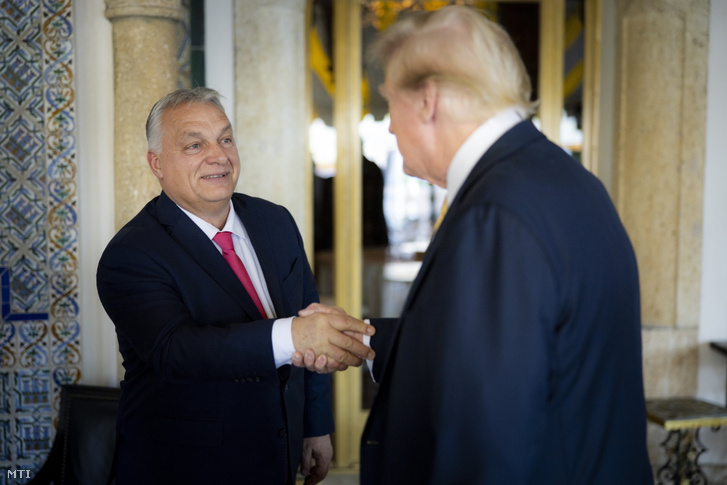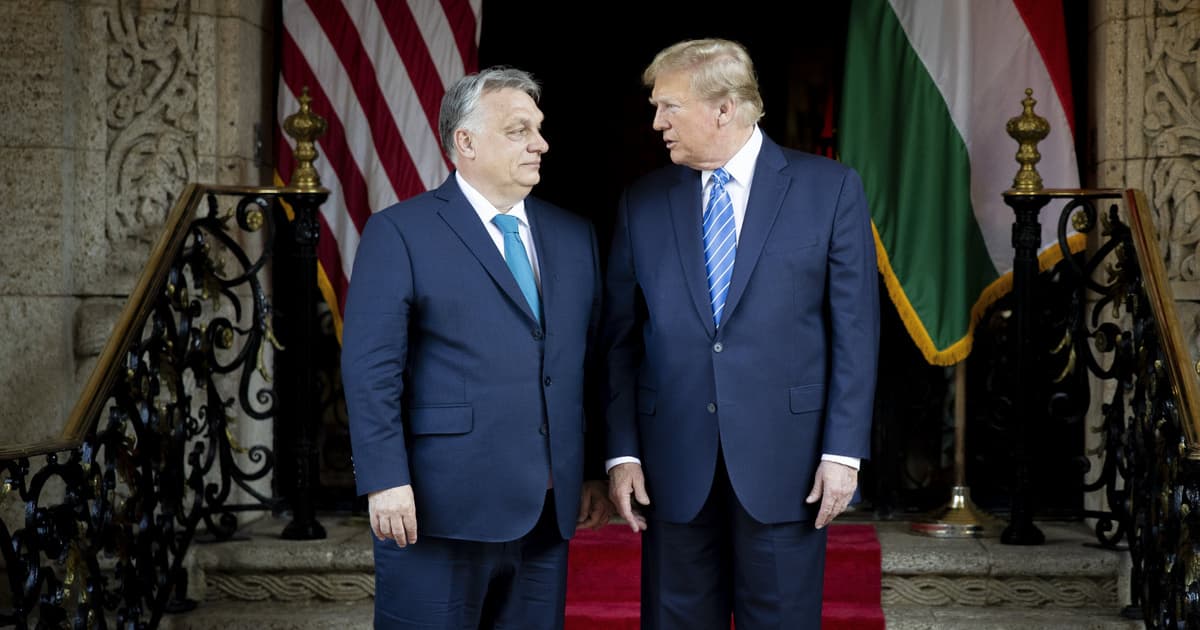Prime Minister Viktor Orbán has recently shared new details about the upcoming Orbán-Trump meeting. According to him, about 80 percent of the topics for the talks have already been agreed upon, but the official announcement will only be made if a final agreement is reached on the remaining issues. Then, due to an activated microphone, it was later revealed that the meeting will take place on November 8th.
There are also serious economic interests behind the bilateral meeting. The first and perhaps most important topic may be the fact that the Hungarian-American double taxation agreement, which was concluded in 1979, expired about a year and a half ago. The lack of this agreement primarily causes problems for Hungarian companies, making business cooperation between the two countries more difficult. The Hungarian government has repeatedly indicated that its minimum goal is to conclude a new tax agreement with the United States.
On Friday, it was revealed that concrete negotiations were already underway in the background: Máté Lóga, the Secretary of State responsible for economic development, held talks in Washington with the head of the US Treasury Department. The two secretaries of state also discussed the issue of reinstating the Hungarian-American double taxation agreement, which was terminated in 2022, and agreed that the parties would begin joint work at an expert level to reinstate the tax agreement as soon as possible. This could bring the reinstatement of the double taxation agreement closer to completion.
Record investments and energy struggle
US-Hungarian relations have picked up spectacularly despite Trump's protectionist tariff policy. Record amounts of US capital are flowing into Hungary, mainly in the areas of research and development and technological innovation, which the government is encouraging with significant subsidies. Minister of Foreign Affairs and Trade Péter Szijjártó has repeatedly stressed that incoming investments are mitigating the negative effects of the tariff war, and that in recent years we have been living in a"golden age" of US-Hungarian relations.
Most recently, Flextronics announced a two billion forint research and development project in Zalaegerszeg, for which the government provided 670 million forints in support. However, since Trump's presidency, several large American companies have also launched new developments in Hungary. While the US president's goal is to relocate production and increase tariffs on industrial goods and raw materials, investments coming to Hungary increasingly affect knowledge-intensive sectors, primarily R&D.
According to VG , the largest research and development project in the history of the National Investment Agency (HIPA) is also linked to an American company: the software development company Diligent Corporation is implementing an investment worth 37 billion forints, for which the Hungarian state is providing eight billion forints in support. But it is also undeniable that Trump urged NATO countries and EU member states to divest themselves of Russian oil.
The entire region is under strong American pressure, and Washington has made no secret of its desire to increase the sale of its raw materials in this area.
“Their natural gas supply is gradually increasing. A battle has practically begun for the region between the Americans and the Russians in energy supply. I don’t know if there will be a point when we decide to try to make a decisive move away from Russian fossil fuels,” Tamás Pletser, an energy analyst at Erste, previously told Index. Moreover, Viktor Orbán has already had to call Trump once about our Russian energy exposure.
All this suggests that when Viktor Orbán meets Donald Trump, Hungarian energy issues will almost certainly be on the agenda. But what tangible economic consequences could the Orbán-Trump meeting in November have? Is it possible that they are preparing for major announcements? We spoke about this with Péter Bárány and Marcell Horváth, senior researchers at the Hungarian Institute of Foreign Affairs.

What can Viktor Orbán and Donald Trump gain?
Both sides have something to gain from the meeting between Donald Trump and Viktor Orbán – even if the stakes are not the same for the two politicians. It is worth remembering that Orbán met with Trump and Musk at Mar-a-Lago in Florida in December, and it was later revealed that Gellért Jászai, the president of 4iG, also participated in the discussions. This also shows that such bilateral meetings create an opportunity for political and business decision-makers to directly interact with each other at the highest levels.
Therefore, Horváth Marcell told Index that the planned meeting could further strengthen Hungarian-American economic and geopolitical relations. According to Viktor Orbán, the agenda of the talks expected in November will primarily include economic issues. According to him, it was already a major step forward that the government had achieved that Hungarian citizens can travel to the United States without a visa again.
In parallel, nine major American investments have come to Hungary since President Trump's inauguration.
“Perhaps the most important progress of the meeting is expected in the field of the double taxation agreement. The relevant agreement was terminated by the Biden administration in 2022, putting Hungarian companies in a difficult position, as the introduction of double taxation has made trade cooperation between the two countries much more difficult and complicated,” Horváth Marcell told Index. The re-adoption of the double taxation agreement can be considered a significant success, which could bring a new situation in the field of cooperation between the two countries.
The meeting is expected to confirm the government's earlier indication that direct flights between the two countries could resume from May 2026. This could further strengthen economic and tourism ties. The focus of the talks will be on improving Hungarian-American trade conditions, encouraging new American investments, and developing high-tech cooperation.
But a prominent topic could be research and development and energy technology, the development of small-scale modular nuclear reactors, or space industry cooperation – such as the partnership between SpaceX and the Hungarian 4iG. According to leading researchers, the personal meeting could provide an opportunity for the two leaders to outline a future “economic cooperation framework and agenda,” which could accelerate projects currently under negotiation.
When asked whether the meeting could have concrete investment or energy benefits for Hungary – for example in the form of US capital or LNG deals – senior researcher Péter Bárány said that this is possible, but only if diplomacy quickly turns into business. Hungary can only physically import US LNG through regional terminals and connecting pipelines – for example, the Croatian, Greek or Polish routes. Thus, the tangible result of the meeting could be capacity commitments or longer-term purchase contracts. This could strengthen the diversification of the country’s energy sources in the short term and improve Hungary’s bargaining position when negotiating other gas contracts.
As for US capital, the most realistic target areas are energy storage, SMR technology and other nuclear developments, as well as, according to experts, supply chains related to electricity generation. In these sectors, high-level political support can reduce investment risks and open up new financing channels. As the lead researcher put it: the meeting itself will not bring molecules, but the decisions that follow can start real LNG shipments and new investments.
But"defense investments, which can open up cooperation opportunities for actors in the domestic and American defense sectors. This is a common point, as the American government under the Trump administration encourages the increase of European self-defense capabilities, and the Hungarian government is committed to the continuous development of the Hungarian Defense Forces," - summarized Péter Bárány.
This meeting is not only important for Viktor Orbán
According to Marcell Horváth, Hungarian-American economic relations today present a complex picture: opportunities and conflicts of interest are present at the same time. The United States is one of the largest foreign investors in Hungary and plays a significant role in several industries - high-tech, automotive and financial services. American working capital not only creates jobs, but also contributes to technological development and economic growth.
There is also significant potential for expansion in trade between the two countries, especially in the areas of exports and modern services.
However, the relationship is also burdened by conflicts of interest. These primarily concern customs and trade policy. The protectionist measures of the United States – especially during the presidency of Donald Trump – have adversely affected Hungarian exports, especially in the automotive and electronics sectors. An additional difficulty is that the double taxation agreement will expire in 2022, making it more difficult for companies on both sides to operate.
As a member of the EU and NATO, Hungary has to meet several alliance obligations, such as energy independence and relations with Russia. The economic commitments made at the meeting could therefore easily clash with other international expectations, which could cause tension. If the United States were to impose new protective tariffs on the EU, it would create uncertainty – and as an EU member, Hungary would only be able to react independently to a limited extent.
And the leading researchers of the Hungarian Institute of Foreign Affairs also reminded us that Hungarian foreign policy, in the spirit of"opening to the East", cultivates close relations with China. In recent years, Hungary has become the largest European destination for Chinese investments, with a record amount of Chinese capital arriving in the country in the first half of 2025.
Bilateral trade exceeds $16 billion, and strategic projects such as the Budapest-Belgrade railway line or various energy and high-tech developments are underway.
The Hungarian government aims to further strengthen its position as a hub for Chinese investment in Europe. However, this is being increasingly viewed critically by the United States due to growing geopolitical competition and dependence on China. The American side fears that Hungary is moving too China-oriented, which could be a sensitive point in the Trump-Orbán meeting. Therefore, a pragmatic, balanced approach will be essential.
Thus, the meeting could be of strategic importance for both parties. It would provide an opportunity to ease customs and tax tensions, promote the settlement of double taxation, and explore new investment opportunities. All of this could increase the predictability and competitiveness of the Hungarian economy in the American market, while strengthening technology transfer and the development of the high-tech sector.

Economic opening and foreign policy balance
As we wrote earlier, the United States is one of the most significant investors in Hungary. American companies support tens of thousands of jobs across the country. Minister of Foreign Affairs and Trade Péter Szijjártó previously said that over the past ten years, more than 140 American investments have come to Hungary, for which the government has also provided support. These projects have created a total of about 19 thousand new jobs. The Hungarian government is therefore actively striving to strengthen American economic relations.
“At the same time, Hungary is an export-oriented economy, largely focused on European Union markets. Cooperation with the United States as a guide cannot necessarily quickly translate into significant volumes of trade between Hungary and America. According to the data for 2024-25, exports to the United States are relatively low,” Marcell Horváth emphasized to the Index.
What is certain, however, is that the meeting is expected to go beyond mere political symbolism. As the government has already indicated, the agenda of the negotiations will primarily include specific economic issues, agreements and even new investment projects. The renegotiation of the double taxation agreement, customs relief, and industrial and high-tech cooperation could all bring tangible benefits to economic actors.
At the same time, the political message cannot be neglected. Such a meeting could strengthen Hungary's international weight and send a message to the world that the country is thinking in a multilateral alliance system and does not want to get stuck in unilateral dependencies. According to Marcell Horváth, the result of Hungarian foreign policy, which focuses on connectivity, is that
Today, Hungary is able to negotiate with almost every global power on specific issues and achieve results.
Hungary is thus consciously positioning itself as a bridge between the United States and the European Union, and between the West and the East. The planned Trump-Putin peace summit in Budapest also fits into this strategy. The current visit is therefore a clear signal from a foreign policy perspective. An economically focused bilateral meeting with the president of a G7 member state could also affect Hungary's EU position and ability to assert its interests. International analysts and market participants see this as a kind of maneuver: an attempt to broaden foreign economic relations and reduce exclusive dependence on the EU.
At the same time, it also shows that Hungary is ready to pursue a more independent, pragmatic foreign policy if this can bring economic benefits. And according to Marcell Horváth, senior researcher at the Hungarian Institute of Foreign Affairs, deepening relations with the United States could be beneficial for Hungary in several ways. It could diversify external dependencies – for example, on EU markets or the German automotive industry – while making the country an attractive investment destination in the region.
Hungary can offer good conditions for American companies: a skilled workforce, developed infrastructure, and a favorable tax environment. In addition, expanding investments would also fit into America's regional strategy:
In addition to the traditional American economic centers – Poland and Romania – opening up to Hungary could further strengthen the American presence in Central Europe.
Overall, the meeting sends a diplomatic message that Hungary is trying to improve its international standing and rebuild its network of relationships within the Western alliance network. This is a significant political message in itself – especially in light of the tensions experienced previously with the European Union and the United States. However, tangible economic results can only be expected if diplomatic rapprochement is followed by real projects, agreements and policy cooperation. Based on the developments of recent months, there are more and more encouraging examples of this.

